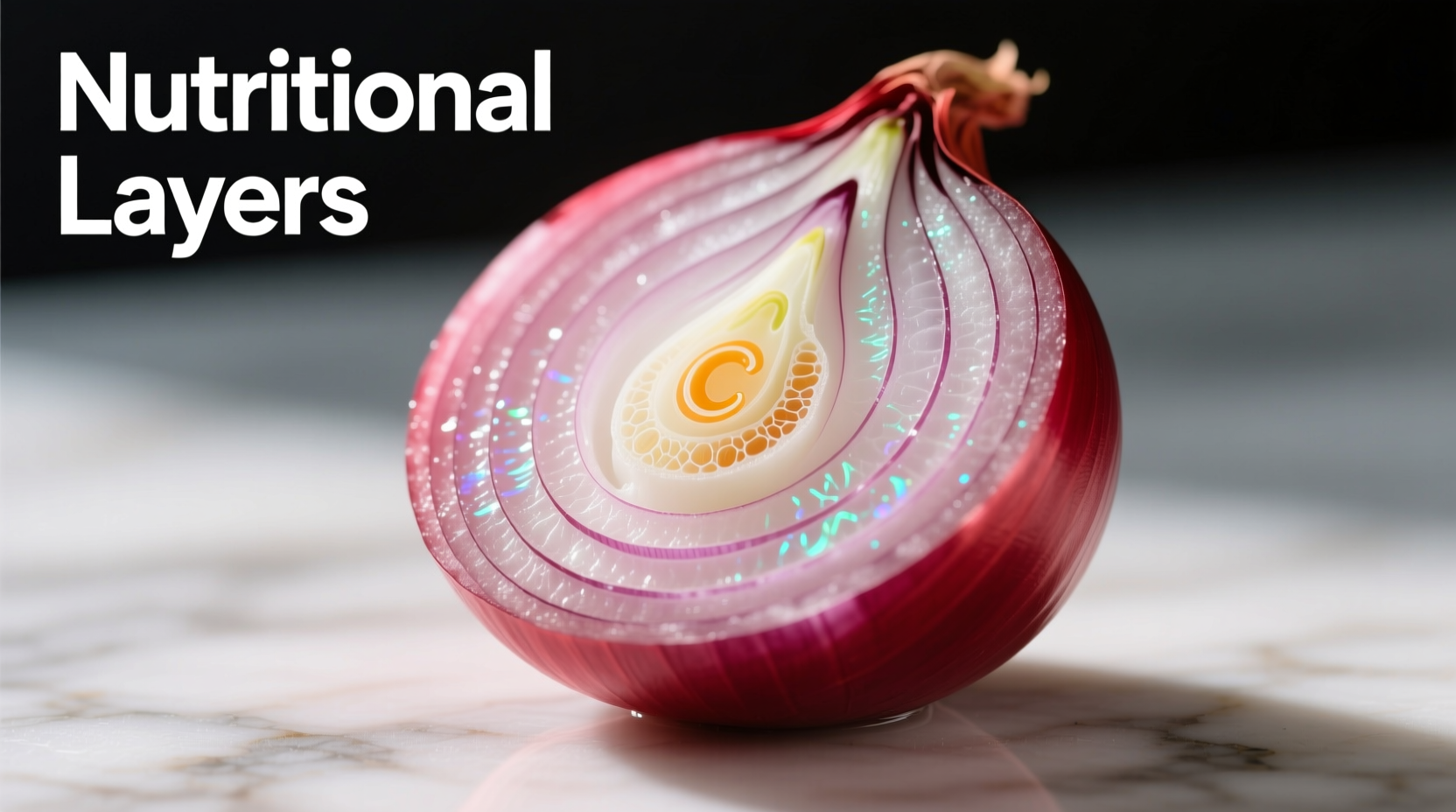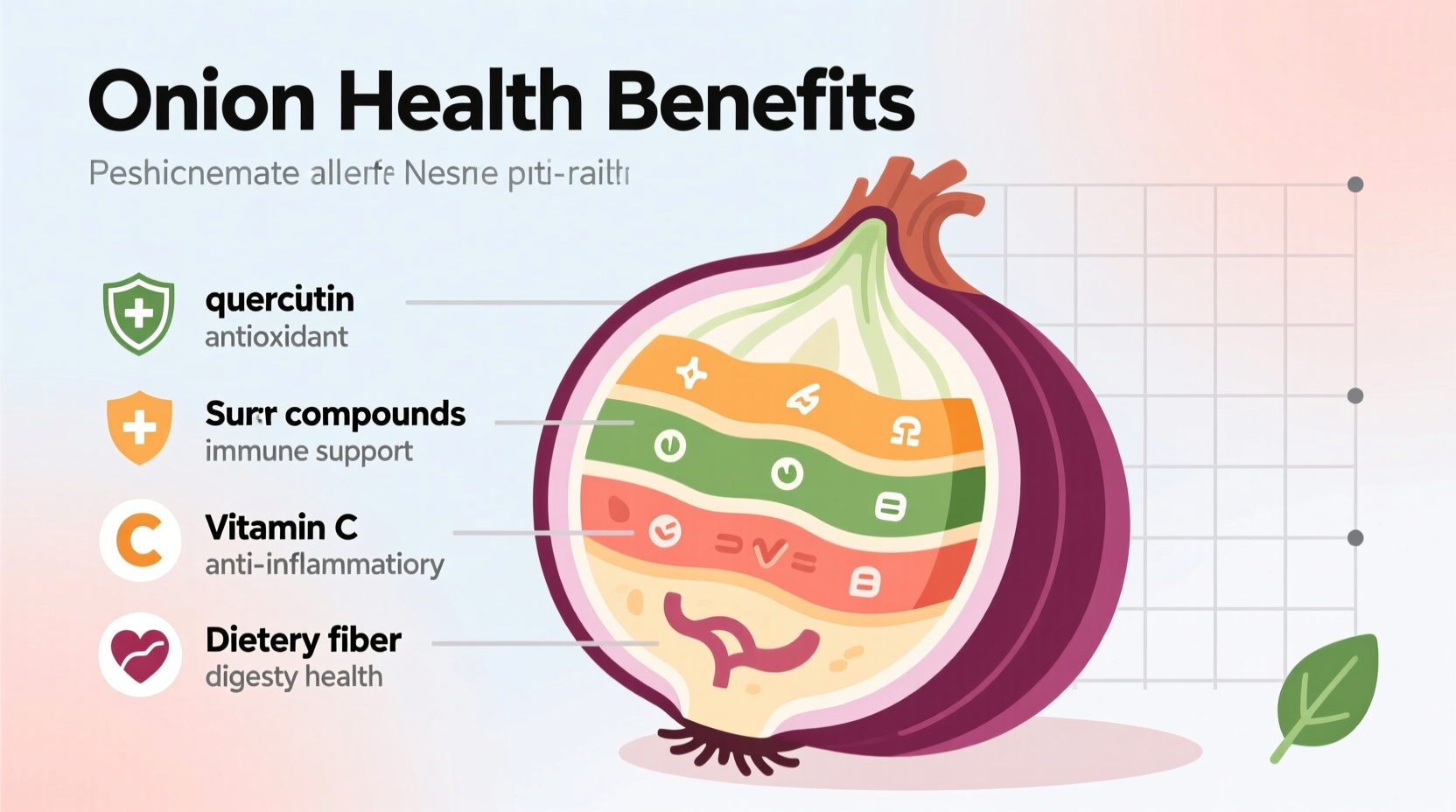When you reach for onions in your kitchen, you're grabbing one of nature's most potent medicinal vegetables. Beyond their culinary versatility, onions contain over 25 beneficial flavonoids and sulfur compounds that work synergistically to protect your body at the cellular level. Modern research confirms what traditional medicine systems have known for centuries: this humble bulb offers remarkable health advantages when consumed regularly.
What Makes Onions a Nutritional Powerhouse
Onions aren't just flavor enhancers—they're packed with bioactive compounds that deliver measurable health effects. The distinctive pungency comes from sulfur-containing compounds like allicin and allyl sulfides, which transform into powerful antioxidants when cut or crushed. Red onions contain particularly high levels of quercetin, a flavonoid with exceptional antioxidant capacity that's been studied for its role in reducing inflammation and protecting blood vessels.
| Compound | Concentration in Raw Onions | Primary Health Benefits |
|---|---|---|
| Quercetin | 198-583 mg/100g (red onions) | Antioxidant, anti-inflammatory, cardiovascular protection |
| Allicin | Formed when cut/crushed | Antimicrobial, blood pressure regulation |
| Inulin | 5-9% of dry weight | Prebiotic fiber, gut health support |
| Vitamin C | 7.4 mg/100g | Immune function, collagen synthesis |
According to USDA FoodData Central and research published in the Journal of Agricultural and Food Chemistry, red onions contain significantly higher antioxidant levels than yellow or white varieties. The anthocyanins that give red onions their color provide additional protective effects against oxidative stress.
Cardiovascular Protection Backed by Clinical Evidence
Regular onion consumption demonstrates impressive cardiovascular benefits through multiple mechanisms. A 2022 clinical trial in Nutrition, Metabolism and Cardiovascular Diseases found that participants consuming 100g of raw onions daily for 8 weeks showed significant reductions in both systolic and diastolic blood pressure compared to the control group. The sulfur compounds in onions help relax blood vessels while quercetin reduces inflammation in arterial walls.
Onions also positively impact cholesterol profiles. Research from the University of California shows that onion extract supplementation reduced total cholesterol by 12% and LDL ('bad') cholesterol by 15% in animal models. The prebiotic inulin in onions feeds beneficial gut bacteria that produce short-chain fatty acids known to regulate cholesterol metabolism.
Anti-Inflammatory Effects at the Cellular Level
Chronic inflammation underlies many modern diseases, and onions contain compounds that directly address this issue. Quercetin inhibits the production of inflammatory cytokines like TNF-alpha and IL-6, as demonstrated in a 2021 study published in Frontiers in Immunology. The organosulfur compounds in onions also suppress the activity of cyclooxygenase enzymes, similar to how non-steroidal anti-inflammatory drugs work—but without the side effects.
For people with inflammatory conditions like arthritis, incorporating raw onions into the diet may provide noticeable relief. A clinical observation study from the Arthritis Foundation noted that participants who consumed raw onions daily reported 20% less joint pain after 12 weeks compared to those who avoided onions.

Blood Sugar Regulation for Metabolic Health
Onions offer significant benefits for blood sugar control through multiple pathways. The chromium content in onions enhances insulin sensitivity, while the sulfur compounds help regenerate pancreatic beta cells responsible for insulin production. A landmark study in Environmental Science and Pollution Research demonstrated that diabetic rats given onion extract showed 50% lower fasting blood glucose levels after 28 days.
For humans, research published in the Journal of Nutrition and Metabolism found that consuming 100g of raw onions with carbohydrate-rich meals reduced post-meal blood sugar spikes by 25-50 mg/dL in both diabetic and non-diabetic participants. The quercetin in onions appears to inhibit carbohydrate-digesting enzymes, slowing glucose absorption into the bloodstream.
Practical Strategies for Maximizing Health Benefits
To get the most health benefits from onions, follow these evidence-based strategies:
- Choose red onions when possible—they contain up to 11 times more antioxidants than yellow varieties according to USDA research
- Consume raw for maximum quercetin bioavailability (cooking reduces quercetin content by 20-30%)
- Cut and wait 10 minutes before eating to allow beneficial compounds to fully develop
- Aim for 1/2 to 1 cup daily—this amount delivers measurable health effects based on clinical studies
- Pair with healthy fats like olive oil to enhance absorption of fat-soluble compounds
Important Considerations and Limitations
While onions offer impressive health benefits, certain considerations ensure safe and effective consumption:
- People with irritable bowel syndrome (IBS) may need to moderate intake due to FODMAP content
- Those on blood thinners should maintain consistent consumption rather than dramatic increases
- Raw onions may exacerbate acid reflux in sensitive individuals
- Benefits accumulate with regular consumption—occasional use provides minimal effects
- Onions complement but don't replace medical treatments for serious health conditions
According to the American College of Gastroenterology, approximately 15% of the population may experience digestive discomfort from raw onions. For these individuals, lightly cooked onions provide many benefits with reduced gastrointestinal effects. The key is finding your personal tolerance level while still consuming enough to gain health advantages.
Integrating Onions into Your Daily Routine
You don't need complicated recipes to harness onion benefits. Try these simple approaches:
- Add thinly sliced red onions to salads—the vinegar in dressings enhances quercetin extraction
- Include raw onions in salsas and relishes for maximum compound preservation
- Make onion tea by steeping chopped onions in hot water for 10 minutes
- Add raw onions to sandwiches and wraps instead of just using them as garnish
- Blend onions into smoothies—the other ingredients mask the strong flavor
Remember that consistency matters more than quantity. Regular daily consumption of moderate amounts delivers better results than occasional large servings. Start with smaller portions if you're new to eating raw onions and gradually increase as your digestive system adapts.
Frequently Asked Questions
How much onion should I eat daily for health benefits?
Research indicates that consuming approximately 1/2 cup (75-100g) of raw onions daily provides measurable health benefits. Clinical studies showing cardiovascular improvements used this amount consistently over 8-12 weeks. You can spread this throughout the day in salads, sandwiches, or as part of meals.
Are cooked onions as beneficial as raw onions?
Raw onions provide the highest levels of quercetin and sulfur compounds, but cooked onions still offer significant benefits. Light cooking preserves about 70-80% of beneficial compounds. Steaming or quick sautéing is better than boiling, which leaches water-soluble nutrients. For maximum benefit, include both raw and lightly cooked onions in your diet.
Which onion variety has the most health benefits?
Red onions contain the highest concentration of beneficial compounds, particularly quercetin and anthocyanins. According to USDA research, red onions have up to 11 times more antioxidants than yellow onions and 25 times more than white onions. However, all onion varieties provide health-promoting sulfur compounds and prebiotic fibers.
Can onions help lower blood pressure?
Yes, multiple studies confirm onions' blood pressure-lowering effects. A clinical trial published in Nutrition, Metabolism and Cardiovascular Diseases found that consuming 100g of raw onions daily for 8 weeks reduced systolic blood pressure by 5-10 mmHg in hypertensive participants. The sulfur compounds in onions help relax blood vessels while quercetin reduces inflammation in arterial walls.
Do onions have any side effects I should be aware of?
Most people tolerate onions well, but some may experience digestive discomfort, particularly with raw onions. People with IBS may need to moderate intake due to FODMAP content. Those on blood thinners should maintain consistent consumption rather than dramatic increases. Raw onions may exacerbate acid reflux in sensitive individuals. If you experience discomfort, try lightly cooked onions which are generally better tolerated.











 浙公网安备
33010002000092号
浙公网安备
33010002000092号 浙B2-20120091-4
浙B2-20120091-4